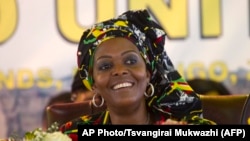The lawyer representing South African model Gabriella Engels, who was allegedly attacked by Zimbabwe’s former First Lady Grace Mugabe with an extension cord last year, says he welcomes the South African government’s decision to issue a warrant of arrest for the former first lady.
Willie Spies, who represents both Engels and the non-profit group Afriforum which advocates for the rights of minorities, says the issuance of the warrant represents justice for Engels.
“We are very glad to hear the news that the national prosecuting authority has gone to the length of issuing a warrant of arrest for Grace Mugabe,” said Spies.
The warrant of arrest for Mrs. Mugabe relates to a 2017 incident where she allegedly attacked Engels, who was with her sons in a hotel room in Johannesburg, with an extension cord, causing damages to her face.
Following the incident, Mrs. Mugabe applied for and was granted immunity, and allowed to leave the country, without answering to the charges.
Afriforum challenged South Africa’s decision to grant Mrs. Mugabe immunity, resulting in the high court overturning the decision earlier this year, paving the way for the arrest warrant to be issued, Spies explained.
“We were involved in a civil process and the civil process was actually to take the initial decision by the political decision makers on review, to set the diplomatic immunity that was granted to Grace Mugabe,” said Spies. “Since that happened and the court handed down their judgement setting aside the diplomatic immunity, the ball was back in the prosecuting authority’s court.”
For the arrest warrant to be executed, Mrs. Mugabe will have to physically visit South Africa where the warrant is in effect. Alternatively, however, Spies said though South Africa does not have extra-territorial jurisdiction in Zimbabwe, it can request the extradition of Mrs. Mugabe through its global extradition treaties, but ultimately the government of President Emmerson Mnangagwa would have to agree.
“As a country, we do have extradition treaties with countries all over the world which makes provisions for extradition in certain cases, and I assume if the authorities do take necessary steps, it will be possible to apply for her extradition, and then it will be a decision for Zimbabwean authorities, whether they are willing to extradite her,” said Spies.
Speaking on behalf of the Zimbabwe government, Ministry of Information Permanent Secretary Nick Mangwana said they have yet to receive formal notice from South Africa on the arrest warrant, and will only address the issue when it arises.
“As far as the government of Zimbabwe is concerned, we haven’t received anything from South Africa regarding Mrs. Mugabe, so from a government point of view and position, we do not have a position until or unless we receive something from the government of South Africa,“ said Mangwana.
“Then it will be considered by our own due process and will be treated in accordance with our processes and law.”
Mangwana indicated that even if the extradition request was made, the process could be lengthy.
“Extradition is a big process which involves our home affairs, it involves the attorney general, even the ministry of justice, it also involves provincial magistrates.”
Whether or not Mrs. Mugabe is ever arrested, Spies said the mere fact that Mrs. Mugabe will now have to think twice before visiting South Africa for shopping or any other private business, is punishment in itself, and a win for his client, Gabriella Engels.
“If she doesn’t come, nothing will happen but she won’t be able to do any shopping for now, which I think is in itself a huge penalty to her given the excessive spending tendencies that she displayed over the past few years,” said Spies.
Efforts to reach Mrs. Mugabe or her lawyers were unsuccessful.







